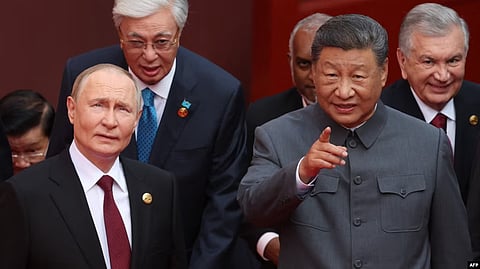
- HOME
- OPINION
- ON GROUND
- INTERVIEW
- INDIA
- NewsGram USA
- WORLD
- न्यूजग्राम
- POLITICS
- ENTERTAINMENT
- CULTURE
- LIFESTYLE
- ECONOMY
- SPORTS
- Jobs / Internships
- Misc.
- NewsGram Exclusive

Amid the fanfare of back-to-back diplomatic gatherings in China last week hosted by Chinese leader Xi Jinping, Beijing and Moscow appeared to secure a massive breakthrough by unveiling a deal to build the long-awaited Power of Siberia-2 gas pipeline.
The September 2 announcement of a legally binding memorandum by Aleksei Miller, CEO of the Russian energy giant Gazprom, made headlines and sent a message that Beijing and Moscow's ties are deepening despite Western pressure.
But energy analysts who spoke to RFE/RL expressed doubts about the megaproject's future given that key details -- such as the price of gas, the volume that will pass through the pipeline, and who will foot the bill for its construction -- are still no closer to being decided.
"A legally binding memorandum is not a supply contract, so it does not constitute a green light on this project," Erica Downs, a senior research scholar at the Center on Global Energy Policy at Columbia University, told RFE/RL. "This gives the illusion of progress, but it is not yet a done deal."
Rather, the recent agreement reached in Beijing appears to be part of ongoing negotiations over the ambitious pipeline that would bring gas from Russia's Yamal Peninsula to northern China via eastern Mongolia.
The new Power of Siberia 2 pipeline would deliver 50 billion cubic meters of gas annually from Russia to China via Mongolia.
Beijing has increasingly gained leverage over Moscow since Russia's 2022 full-scale invasion of Ukraine and its loss of Europe as a primary energy market. China looks to be buying time to see if the Kremlin will cave in negotiations by providing favorable discounts and to see how the project will impact its complicated rivalry with the United States.
"China only committed to kicking the can down the road in case they decide they might need this pipeline," Downs said. "If Beijing can get a low price and flexibility on volume, then it becomes more appealing as an insurance policy. If not, they have other options to explore."
Moscow's need for the proposed 2,600-kilometer pipeline is clear: The Power of Siberia-2 would compensate for at least part of the European Union market it has lost due to fallout from the war in Ukraine.
China, on the other hand, is spoiled for choice.
As discussions with Moscow around the megaproject have stalled and restarted over the years, Beijing has followed a strategy of diversification when it comes to its gas imports as a way to avoid being overly dependent on a single supplier.
Russia is already the country's largest supplier of pipeline gas thanks to the Power of Siberia-1, which became operational in 2019 under a 30-year, $400 billion deal and is now the third-largest provider of liquefied natural gas (LNG) after Australia and Qatar, which ship LNG by sea.
Beijing has also moved to reduce its import dependence and taken moves in recent years to increase its domestic exploration and production of oil and natural gas. This has corresponded with a massive shift toward renewable energy inside China, with the country's companies becoming industry leaders in fields like solar energy and electric vehicle (EV) production.
As a result, demand for imported gas has been falling and is projected to tumble further in the next decade, lessening the need for the Power of Siberia-2, which could carry up to 50 billion cubic meters (bcm) annually. Beijing could also elect to make small increases to existing pipelines from Russia, something Miller also announced in Beijing, rather than build a new one.
"If it does get built, the most optimistic projection is that it starts by 2030," Joseph Webster, a senior fellow at the Atlantic Council's Global Energy Center, told RFE/RL. "That's an additional five years of technological advancements in renewables and batteries that will continue to offset the need for this pipeline."
Adding to the uncertainty over the pipeline's future is that Beijing has yet to confirm the details of Miller's announcement.
Chinese officials have been notably silent on the pipeline, as have Chinese state media, who only referenced the negotiations by citing reporting by Russian or international media that quotes Gazprom's Miller. Following the meeting between Xi, Russian President Vladimir Putin, and Mongolian President Ukhnaagiin Khurelsukh in Beijing, Chinese media quoted Xi as only saying that "hard connectivity" should be a focus on future relations between the three countries.
Benjamin Schmitt, a senior fellow at the University of Pennsylvania, told RFE/RL that the commercial case for the new pipeline is thin and that he views Miller's recent comments as being more about optics as the Kremlin tries to show "the veneer of iron-clad cooperation between these two countries."
"Beijing doesn't need this pipeline," Schmitt, who is also a senior fellow at the Center for European Policy Analysis (CEPA), told RFE/RL. "But there is also no reason for them to say anything negative about it."
(RFE/RL/NS)
Also Read:
